Lost In Myth: How “The Lighthouse” Can Enlighten Us
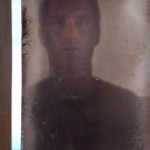 You’ve probably noticed that in every flash-sideways so far on Lost this season, the central character of the episode has been shown looking into a mirror. Kate looks at herself in the auto body restroom after discovering that Claire was pregnant, Locke in his own bathroom just before attempting to call Jack, and Jack looks at himself both in the airplane while noticing the strange mark on his neck, and again in “The Lighthouse” when noticing an appendix scar that he doesn’t seem to remember. The easy metaphor of course, is that we are looking at secondary versions of these characters through the looking glass. But what’s the deeper meaning for us?
You’ve probably noticed that in every flash-sideways so far on Lost this season, the central character of the episode has been shown looking into a mirror. Kate looks at herself in the auto body restroom after discovering that Claire was pregnant, Locke in his own bathroom just before attempting to call Jack, and Jack looks at himself both in the airplane while noticing the strange mark on his neck, and again in “The Lighthouse” when noticing an appendix scar that he doesn’t seem to remember. The easy metaphor of course, is that we are looking at secondary versions of these characters through the looking glass. But what’s the deeper meaning for us?
The concept of parallel timelines is coming up a lot lately in various TV shows, films, and commercials. In the Season 8 premiere of The Family Guy titled “Road to the Multiverse,” Stewie and Brian explore a series of alternate universes. The episode reminded me of the nineties TV show, Sliders where Jerry O’Connell’s character leaps into various versions of earth along with three friends. 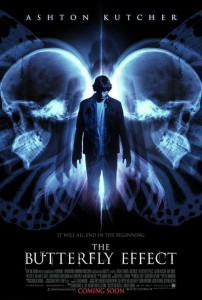 Most recently is ABC’s FlashForward, which offers peaks into a future that apparently can be altered, rendering it as an alternate timeline. There have also been several commercials lately featuring doppelgangers of characters that exist in a happier existence because they chose to go back to school, save wisely, or buy a particular car. The insinuation is that if they don’t make these wise choices they will continue within their current, crappy existence. My favorite movie about alternate timelines is The Butterfly Effect from 2004 where Ashton Kutcher’s character continually changes moments from his past to yield unexpected results. All of these themes could be teaching us how time may really work, and with the veil of our illusionary reality seeming to get thinner, we just might get to actually experience it for ourselves real soon.
Most recently is ABC’s FlashForward, which offers peaks into a future that apparently can be altered, rendering it as an alternate timeline. There have also been several commercials lately featuring doppelgangers of characters that exist in a happier existence because they chose to go back to school, save wisely, or buy a particular car. The insinuation is that if they don’t make these wise choices they will continue within their current, crappy existence. My favorite movie about alternate timelines is The Butterfly Effect from 2004 where Ashton Kutcher’s character continually changes moments from his past to yield unexpected results. All of these themes could be teaching us how time may really work, and with the veil of our illusionary reality seeming to get thinner, we just might get to actually experience it for ourselves real soon.
According to most of the theories within the realm of quantum physics, time is an illusion, or at least, does not work in the linear fashion it appears to from our perspective. The basic idea is that every possibility that could’ve ever happened, may one day happen, or is happening all exist in one moment, and that what we focus on becomes our linear experience. The concept is most popularly known as the many-worlds or multiverse theory (hence, the Family Guy episode title). The theory holds that when there are options for an object to exist in multiple states, the universe reveals equally as many universes where that object can experience any one of those multiple options. Similarly, according to the concept of superposition, if we do not know the state of a given object, it actually exists in all possible states as long as we don’t look to see. Once we do, the object is then limited to that single possibility.  (On Lost, Jack wonders why they’ve never seen the lighthouse—symbolic of spiritual enlightenment—before. Hurley responds that maybe they weren’t looking for it.) So, putting these concepts together and making it relevant for us: in any given moment there are as many parallel worlds as there are options to choose from, and wherever our mind goes, we go.
(On Lost, Jack wonders why they’ve never seen the lighthouse—symbolic of spiritual enlightenment—before. Hurley responds that maybe they weren’t looking for it.) So, putting these concepts together and making it relevant for us: in any given moment there are as many parallel worlds as there are options to choose from, and wherever our mind goes, we go.
It sounds kind of confusing, but really, it’s no different than a video game. You can hold a video game disc in your hand. On that disc is all the programming that the characters within it could ever experience. Its entire life and all its life possibilities exist in one moment. As you play that game, you continually have the freedom of choice to select various paths and options that will lead to a new set of circumstances. Of course, all of these choices and circumstances have already been written into the programming code. But from the character’s perspective in the game, it all seems like a series of new experiences that have formed one path through its life. Should the character die, it’s game over from its point of view and those in that particular version of its reality. But as the game players, we can simply hit the reset button and play the game again. Perhaps if the character had memories or feelings, it might feel as though certain aspects of this second game seem vaguely familiar. It might recognize a major character on its journey or get a sense of déjà vu when it makes a particular choice it had made in the previous game.
The reason the video game metaphor seems to fit so well with our reality, is because this world may work similarly. The major difference is that we may be the ones playing our own characters’ game pieces without realizing it. How ironic that we may have had full control of our lives all along, but that since most of us tend to focus on worrying and negative outcomes that’s where we go.
Imagine you have an upcoming challenge to face. Successful people tend to focus on the best-case scenario and imagine how they can get there. They also imagine possible hindrances to their objective, but they don’t dwell on them or worry about them. When most people have challenges however, this is exactly what they do. They imagine the worst-case scenario first, in order to prepare for it should it happen. They then imagine different ways they could deal with it. This creates a picture in their mind along with the emotions they would feel during such a scenario. What they don’t realize is that they are giving energy to this outcome, and thereby moving their game piece toward that reality.
This is what the law of attraction mentioned in The Secret is really all about. It isn’t magical thinking. It’s simply about experiencing the best version of yourself that already exists. It’s about leaping into the reality where things work the way you want simply by focusing on that outcome. Much like the 1973 Mets, “Ya gotta believe!” You might not get exactly what you envision, but you will get that much closer. And maybe, by continuing to believe, you’ll eventually get there.
So if you wish your life were different, that’s your first mistake. You are focusing on what you don’t want rather than what you do. Instead of thinking about the negatives, think and act as though your life is as you want it to be and your mindset will carry you to that version of reality. Right now, there is a version of you that is totally fulfilled—focus on that, connect an emotion with it, live as though it’s already happened (there’s that leap of faith theme again mentioned in “Lost ‘316’ on Leaps of Faith & the Cycle of Life”). Do this and you just might begin to experience this reality, while your current reality will continue to exist for another version of yourself. Most likely, your thoughts will simply nudge you closer to where you want to be, but at least it’s a start. And once you get some momentum going, you might get to experience the very best version of yourself. This doesn’t necessarily mean that your life will be easy, but that you will be the most fulfilled. That you have come to terms with an illness or handicap, feel like the luckiest person in the world, or have patched up issues with your son.
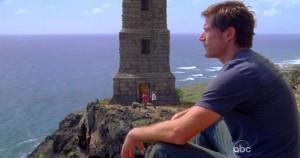 From the beginning, Lost has focused on daddy issues. Perhaps these were simply leaked out from Jack’s consciousness all along. Perhaps everyone’s issues had kind of blended together creating a problem stew that had to be properly resolved for the characters to be redeemed. Those with the deepest issues led to events that showed up the most on the island and took the longest to resolve. Why did Jacob want Jack to see that mirror into his life in the lighthouse? Perhaps it wasn’t so much to make Jack feel watched, but to see how his life could be. Much like the ghost of Christmas Future referenced by Sawyer in “The Substitute,” maybe Jacob is just giving Jack a glimpse into a possible future where things can work out, or, remind him of his troubled past with his dad so he can deal with those issues from a new perspective—and let go of them.
From the beginning, Lost has focused on daddy issues. Perhaps these were simply leaked out from Jack’s consciousness all along. Perhaps everyone’s issues had kind of blended together creating a problem stew that had to be properly resolved for the characters to be redeemed. Those with the deepest issues led to events that showed up the most on the island and took the longest to resolve. Why did Jacob want Jack to see that mirror into his life in the lighthouse? Perhaps it wasn’t so much to make Jack feel watched, but to see how his life could be. Much like the ghost of Christmas Future referenced by Sawyer in “The Substitute,” maybe Jacob is just giving Jack a glimpse into a possible future where things can work out, or, remind him of his troubled past with his dad so he can deal with those issues from a new perspective—and let go of them.
Past or future—it doesn’t matter. It’s all an illusion that only exists in our head. The only thing that matters is right now, because it is from the now that we can set the course for our lives. Of course, while we do have the freedom to choose any version of our lives that have been written, we cannot leap into one that has not been. It’s just like those old Choose Your Own Adventure books I’ve mentioned before. You can choose any combination of adventures in the book, but you cannot choose an adventure that isn’t written in its pages. 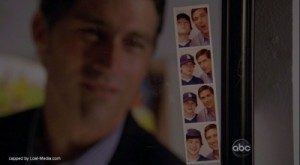 Similarly, you can chose to slip into a version of your life where you have a loving family or where you run a successful business or have become a famous writer, but there is probably no version of your life where you can fly or are a super villain or the richest person in the world. Chances are, it’s just not your path. But it might be someone else’s. Well, except maybe the flying thing. But then again, you never know.
Similarly, you can chose to slip into a version of your life where you have a loving family or where you run a successful business or have become a famous writer, but there is probably no version of your life where you can fly or are a super villain or the richest person in the world. Chances are, it’s just not your path. But it might be someone else’s. Well, except maybe the flying thing. But then again, you never know.
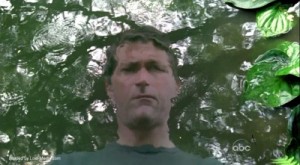 In “The Lighthouse” Lost has planted a seed that encourages us to imagine what other versions of our lives might be like. What would we find by going down the rabbit hole or through the looking glass?
In “The Lighthouse” Lost has planted a seed that encourages us to imagine what other versions of our lives might be like. What would we find by going down the rabbit hole or through the looking glass? 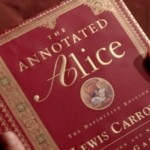 This episode was filled with so many Alice in Wonderland references it almost became distracting. We’ve seen the storybook before, and the key hiding underneath the rabbit. Now, we’re getting tons of scenes where characters are looking at their reflections—in bathroom mirrors, in water, in lighthouses, etc. Perhaps in beating us over the head with the symbolism, Lost is simply trying to get us to take a look at ourselves. What kind of story are we creating for our lives? Is it one that is suiting us?
This episode was filled with so many Alice in Wonderland references it almost became distracting. We’ve seen the storybook before, and the key hiding underneath the rabbit. Now, we’re getting tons of scenes where characters are looking at their reflections—in bathroom mirrors, in water, in lighthouses, etc. Perhaps in beating us over the head with the symbolism, Lost is simply trying to get us to take a look at ourselves. What kind of story are we creating for our lives? Is it one that is suiting us?
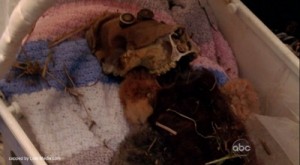 It would seem that Claire has created a story for her life where a group of bad guys have forcefully taken her child away from her. Does she really believe that story, or is it just one she has created to relieve guilt of abandoning her child?
It would seem that Claire has created a story for her life where a group of bad guys have forcefully taken her child away from her. Does she really believe that story, or is it just one she has created to relieve guilt of abandoning her child? 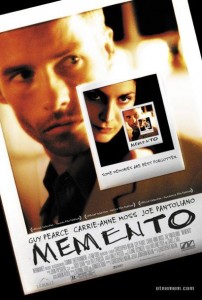 Someone mentioned to me that the scene reminded them of them of the film Memento, where Guy Pearce’s character comes to learn the truth about his quest, but decides to continue with his fabricated story in order to give him something to strive for. Similarly, we sometimes lie to ourselves to avoid cognitive dissonance. Unfortunately, these lies often become self-fulfilling prophecies that we create by the very means described above. Just as Claire has created an enemy out of the Others, we often think ourselves into troubled relationships and scenarios that are completely unnecessary and often even harmful. Lost simply seems to be asking us to take a good look at ourselves. Are you challenging yourself to be the highest possible version of who you could be? Is there a character on the show whose faults and issues seem similar to your own? Sometimes, we are too close to our own problems to see them for what they are. It’s easy to see what a control freak Jack is, or how Kate always runs from her problems, or how Locke creates his own troubles. But it’s much more difficult for us to see when we do the exact same thing.
Someone mentioned to me that the scene reminded them of them of the film Memento, where Guy Pearce’s character comes to learn the truth about his quest, but decides to continue with his fabricated story in order to give him something to strive for. Similarly, we sometimes lie to ourselves to avoid cognitive dissonance. Unfortunately, these lies often become self-fulfilling prophecies that we create by the very means described above. Just as Claire has created an enemy out of the Others, we often think ourselves into troubled relationships and scenarios that are completely unnecessary and often even harmful. Lost simply seems to be asking us to take a good look at ourselves. Are you challenging yourself to be the highest possible version of who you could be? Is there a character on the show whose faults and issues seem similar to your own? Sometimes, we are too close to our own problems to see them for what they are. It’s easy to see what a control freak Jack is, or how Kate always runs from her problems, or how Locke creates his own troubles. But it’s much more difficult for us to see when we do the exact same thing.
So if there’s a character on Lost that you most relate to, just for fun, reflect on the possibility that perhaps you too share the same issues. If so, how might you go about correcting them? Then, do that. Stop being a victim like Locke and rise above your challenges. Face your fears like Kate will have to do if she will be redeemed. And stop trying to control every detail of life like Jack has done…until his conversation with his son. Lost has given us a cornucopia of character archetypes to choose from, so chances are, one fits you—or perhaps a combination might. Regardless, Lost gives us the tools to understand life and help make our own noticeably better. No wonder so many people see it as much more than just a TV show.
Marc Oromaner is a New York City writer whose book, The Myth of Lost offers a simple solution to Lost and uncovers its hidden insight into the mysteries of life. He can be contacted in the discussion section of The Myth of Lost Facebook page.
The Myth of Lost is available on Amazon and barnesandnoble.com.



One Response Leave a comment